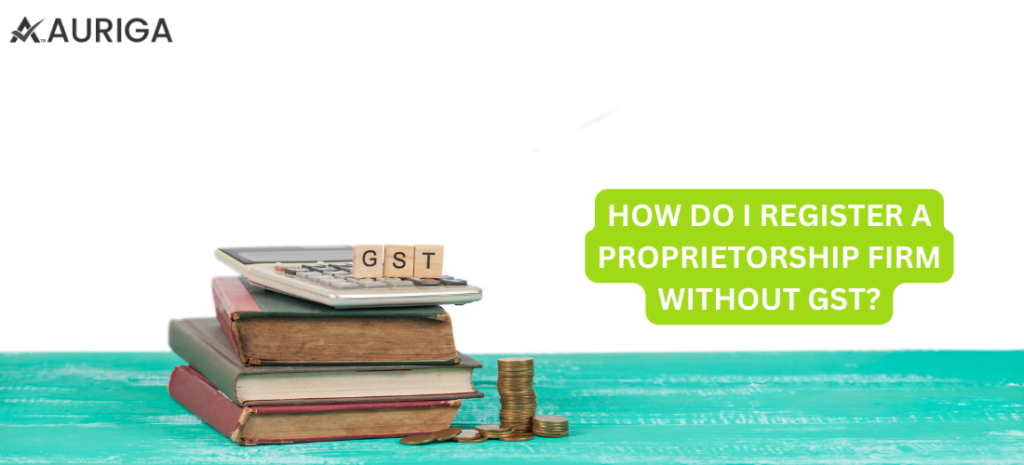HOW DO I REGISTER A PROPRIETORSHIP FIRM WITHOUT GST?
Introduction
Toggle
HOW DO I REGISTER A PROPRIETORSHIP FIRM WITHOUT GST?
INTRODUCTION
A proprietorship firm is a business owned and operated by a single individual. The proprietor is personally liable for all the debts and obligations of the business.
To register a proprietorship firm without GST in India, you need to follow these steps:
- Choose a business name: Select a unique name for your proprietorship firm that is not already registered by another business. You can choose any name as long as it is not infringing on any trademarks or copyrights.
2. Gather required documents: Collect all the necessary documents, as mentioned below, including PAN card, Aadhaar card, bank account proof, and business name proof.
- PAN card of the proprietor
- Aadhaar card of the proprietor
- Proof of business name (such as a trade license or newspaper advertisement)
- Proof of address (such as a utility bill or rental agreement)
- Bank account statement (to show that you have a business bank account)
3.File the registration form: You can file the registration form online or offline. The online form can be found on the website of the Ministry of Corporate Affairs (MCA). The offline form can be obtained from the MCA office in your state.
4. Pay the registration fee: The registration fee for a proprietorship firm is INR 1,000. You can pay the fee online or offline.
5. Get the registration certificate: Once you have filed the registration form and paid the registration fee, you will be issued a registration certificate. This certificate will be your proof of registration.
BENEFITS OF REGISTER A PROPRIETORSHIP FIRM WITHOUT GST
- Easy to set up: Registering a proprietorship firm is a relatively simple process. You can do it yourself without the help of a lawyer or accountant.
- Low cost: The registration fee for a proprietorship firm is INR 1,000. This is a relatively low cost compared to other business structures.
- No need to file GST returns: If your annual turnover is less than INR 20 lakh, you do not need to register for GST. This means that you will not have to file GST returns or collect GST from your customers.
- Full control: As the proprietor, you will have full control over the business. This includes making all the decisions, setting the business direction, and managing the finances.
- Flexibility: You can be as flexible as you want with your business. You can change the business as needed without having to get approval from anyone else.
- Tax benefits: There are certain tax benefits available to proprietorship firms. For example, you may be able to claim deductions for business expenses.
CONCLUSION
Registering a proprietorship firm without GST is a relatively simple process. However, it is important to weigh the advantages and disadvantages carefully before making a decision. If you are considering registering a proprietorship firm without GST, you should consult with an accountant or lawyer to get professional advice.
HOW AURIGA ACCOUNTING HELP YOU TO REGISTER A PROPRIETORSHIP FIRM WITHOUT GST
Business Registration Information: Accounting software can help you organize and manage essential information required for registering a proprietorship firm. This includes details about the business name, business structure (sole proprietorship), business address, and other relevant information.
Documentation Management: Accounting software often includes features for document management. You can use it to securely store and manage important documents, such as business licenses, permits, identification proofs, and other legal documents needed for the registration process.
Financial Recordkeeping: Accounting software is designed to track financial transactions, including income and expenses. This is crucial for documenting your business’s financial history, which may be required during the registration process.
Financial Statements: The software can generate financial statements, such as profit and loss statements and balance sheets. These statements may be needed when registering your proprietorship firm or for business loan applications.
Tax Compliance: While GST registration may not be required for all proprietorship firms, you might still be subject to other tax obligations, such as income tax. Accounting software can help you keep track of your financial data, making it easier to comply with tax regulations.
Invoicing: If your business engages in sales or services, accounting software can assist in creating professional invoices for your clients. This is essential for keeping records and facilitating payments.
Expense Tracking: You can record and categorize your business expenses using accounting software. This helps you monitor your spending and keep your financial records organized.
Bank Reconciliation: Accounting software can reconcile your bank statements with your recorded transactions, ensuring that your financial records are accurate and up to date.
Reporting: The software typically offers various reporting features that allow you to generate financial reports and statements, which can be useful for both internal management and external purposes.
User-Friendly Interface: Many accounting software solutions are designed with user-friendly interfaces, making it easier for entrepreneurs and small business owners to manage their financial records, even without extensive accounting knowledge.



